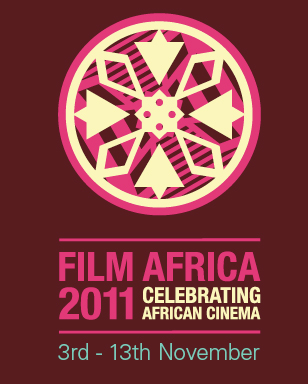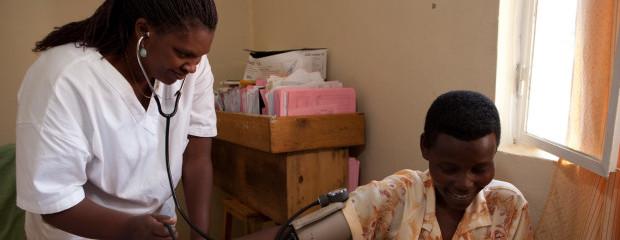Film Africa 2011: Celebrating African Cinema – by Lindiwe Dovey

 There has never been greater interest in African film. A half-century after Africans started making their own films, supplanting the patronising images evident in colonial cinema set in Africa, African Cinema is finally being recognised across the globe. Nollywood, Nigeria’s thriving video film industry, has revolutionised film production and distribution on the continent, and is hugely popular throughout Africa as well as in Asia, the US, the Caribbean, and Europe. In 2010, UNESCO formally recognised Nollywood, with its output of about 2,000 films a year, as the second largest film industry in the world, after Bollywood. And yet, there is still much work to be done to ensure that African films of all kinds are made visible and available to audiences globally.
There has never been greater interest in African film. A half-century after Africans started making their own films, supplanting the patronising images evident in colonial cinema set in Africa, African Cinema is finally being recognised across the globe. Nollywood, Nigeria’s thriving video film industry, has revolutionised film production and distribution on the continent, and is hugely popular throughout Africa as well as in Asia, the US, the Caribbean, and Europe. In 2010, UNESCO formally recognised Nollywood, with its output of about 2,000 films a year, as the second largest film industry in the world, after Bollywood. And yet, there is still much work to be done to ensure that African films of all kinds are made visible and available to audiences globally.
Film Africa (www.filmafrica.org.uk), a ten-day, annual celebration of African Cinema at venues across London, seeks to redress this gap between African films and audiences. Hosted by the brand new Hackney Picturehouse, and also taking place at The Ritzy in Brixton, The Rich Mix in Shoreditch, Screen on the Green in Islington, and The Frontline Club in Paddington, Film Africa 2011 has been designed to be accessible to audiences across the capital. We have hand-picked the best contemporary African feature, documentary, short, and experimental films for London audiences to sample, and have complemented the screenings with a line-up of exciting Q&As with filmmakers and actors, panel discussions with experts to contextualise issues presented in the films, live music to celebrate Africa’s diverse artistic talents, and professional workshops.
More than forty films will be screened at Film Africa 2011, which runs 3-13 November, providing a truly continent-wide vision from and of Africa. While we have focused on selecting films from a diverse range of African contexts, and that represent the very best and most original work in African filmmaking (with eighteen UK premieres), we have also tailored our programme along thematic lines, including Resistance and Cultural Memory, African Women Filmmakers, Everyday Heroines, African Music, Family Life, and Migrations and Returns.
For our Resistance and Cultural Memory strand, we sought films that express the fervour of the resistance movements that have swept across the African continent in 2011, inspired by the revolutions in Tunisia, Egypt and Libya, and older films that give historical depth to these revolutions. We are delighted to launch the festival with the award-winning Egyptian film Microphone (dir. Ahmad Abdalla), which takes the pulse of contemporary Egypt. Khaled Abol Naga, the star of the film and a celebrated Egyptian actor, singer and human rights activist, will introduce the film, which focuses on the vibrant, underground music and cultural scene in the city of Alexandria. Classic films such as Sarah Maldoror’s Sambizanga (1972), shot while the Angolan war of liberation was still raging (and, notably, the first feature film made in Africa by a woman), and veteran Ethiopian filmmaker Salem Mekuria’s Deluge (1997), which is a memorial to her brother who disappeared during the students’ revolution of the 1970s in Ethiopia, allow for a more profound consideration of instances of resistance in Africa, and are also examples of our focus on African Women Filmmakers.
While Maldoror and Mekuria are among the well-established women filmmakers whom Film Africa 2011 will honour, we will also feature the work of up-and-coming African women directors who are revolutionising the gender imbalance that has existed in African filmmaking since the 1960s. French-Burkinabé director Sarah Bouyain’s debut feature film, The Place in Between (2010), explores questions of motherhood, migration, and mixed-race identity through its moving story of four women and the ways in which their lives interweave, and lead actress Dorylia Calmel will be present for a post-screening Q&A. Cameroonian director Ariane Astrid Atodji will also be at the festival, speaking to audiences about her multi-award winning documentary Koundi and National Thursday (2010), which focuses on the people of a small Cameroonian village who are addressing their own poverty without the help of outsiders. Three of the eight short films that will compete in The Silver Baobab Award for Best Short African Film – a £2,000 prize sponsored by EcoBank – are by women who are making a mark on the international film scene: Kenyan directors Wanuri Kahiu (Pumzi) and Zipporah Nyaruri (Zebu and the Photo Fish), and Zambian director Rungano Nyoni (Mwansa the Great). Sarah Maldoror will present the winning filmmaker with the Award, which will go towards the filmmaker’s next production. The work of two further young African women filmmakers will be highlighted in our “˜Experimental Africa’ programme: US-born Ghanaian filmmaker Akosua Adoma Owusu, and Nigerian-British director Zina Saro-Wiwa.
We are particularly excited about our “˜Experimental Africa’ programme, given the lack of attention paid to experimental African film and video at film festivals, in spite of an increasing body of such work. At Film Africa 2011, and on the twenty-fifth anniversary year of the making of British-Ghanaian director John Akomfrah’s classic experimental documentary, Handsworth Songs (1986), we are screening nine of the most important experimental films made about black and African identity and history. Handsworth Songs will also set the stage for discussion with leading African cultural figures about the 2011 “˜riots’ in the UK, and their historical precedents. We are delighted that Zina Saro-Wiwa, recently named one of the top 25 Africans leading the continent’s Renaissance by The Times, will be present to talk about experimental cinema in Africa and the diaspora.
With the rise in availability of new digital media formats across Africa, it has become more and more difficult to make easy distinctions between African “˜art cinema’ and “˜popular film’. Many of the films that will be screened at Film Africa 2011 can be considered “˜cross-overs’ – beautifully shot films with high production values but also entertaining in the vein of “˜genre’ films. Pegasus (dir. Mohamed Mouftakir, Morocco, 2010) – winner of the 2011 Fespaco film festival Grand Prize – and The Figurine (dir. Kunle Afolayan, Nigeria, 2009) – winner of multiple 2009 African Movie Academy Awards – are nail-biting thrillers that will have audiences on the edge of their seats. The Athlete, a film that is as entertaining as it is artistic, is a fitting lead-up to the 2012 London Olympics in its tale of the remarkable true story of the great Ethiopian marathon champion Abebe Bikila. The Kenyan film Dreams of Elibidi (a UK premiere) reinvents the “˜message’ film, turning NGO filmmaking on its head; it is a collaboration between well-known British actor Nick Reding (The Constant Gardener, Blood Diamond) and Kenyan actor Kamau Wa Ndung’u, who grew up in Mathare slum in Nairobi.
More than an annual, ten-day film festival of African films and events in London, Film Africa is a platform and springboard for African film and African filmmakers, and a meeting point for networking and exchange of knowledge by and about Africa’s communities within and outside London. We will welcome twenty guests to the festival for Q&As and discussions with audiences, and will hold seven African music nights following screenings, as part of our Film Africa LIVE programme. Importantly, we have listened to what African filmmakers have been telling us for a decade – that, while film festivals are a brilliant first step into the fortress of a cutthroat industry, it is necessary to complement them with attempts to get African films into mainstream distribution. On Saturday 12 November, at The Ritzy cinema in Brixton, we welcome the public to join us for our inauguration of The Distribution Forum, sponsored by Brand Communications, an annual event that will bring together UK-based film distributors with African filmmakers and the general public to find ways of achieving greater visibility for black and African cinema year-round in London.
Film Africa 2011 (3-13 November) is organised by the Royal African Society and SOAS. Visit www.filmafrica.org.uk for the full festival programme.
Lindiwe Dovey is Film Africa 2011 Co-Director and Programming Director




